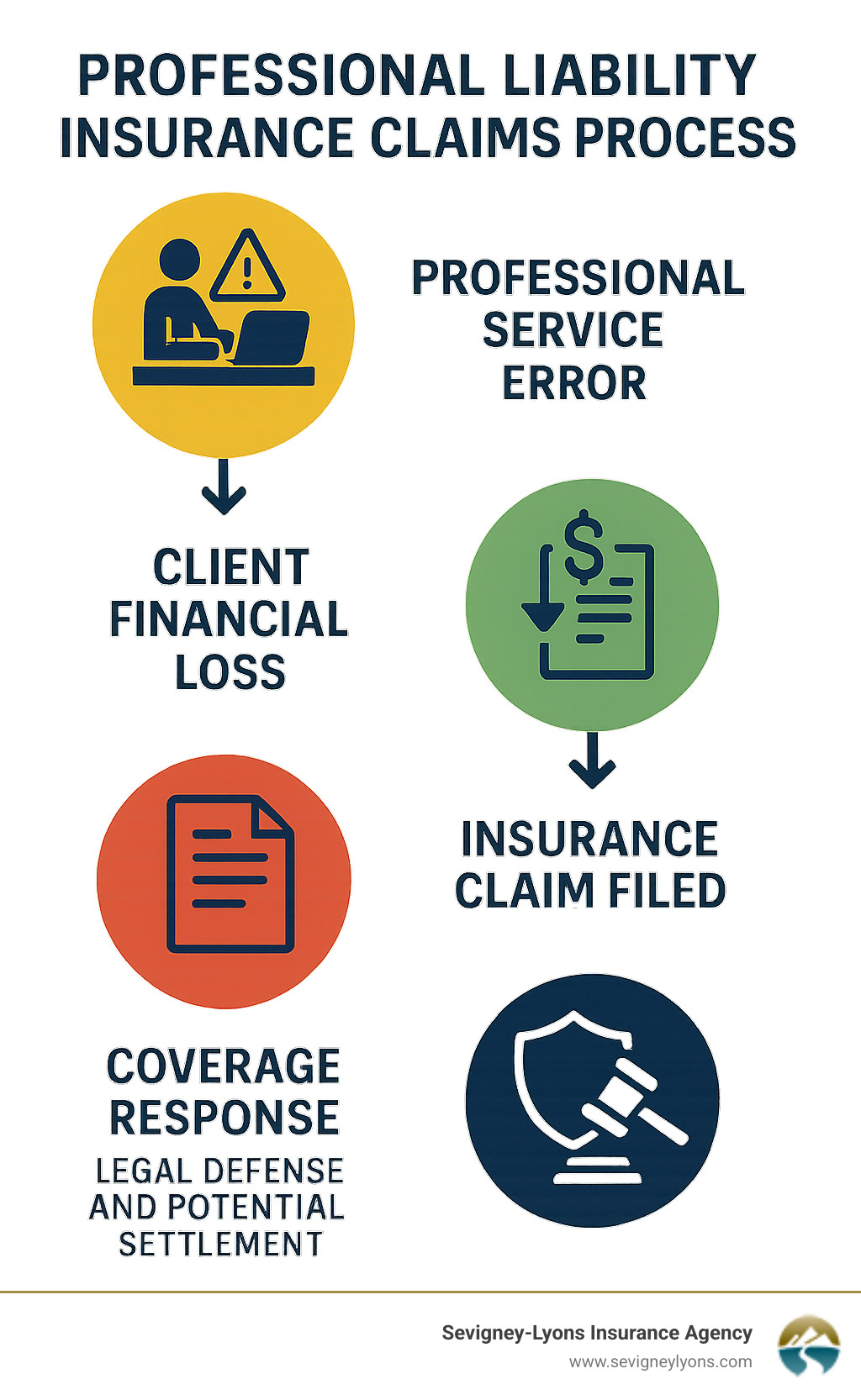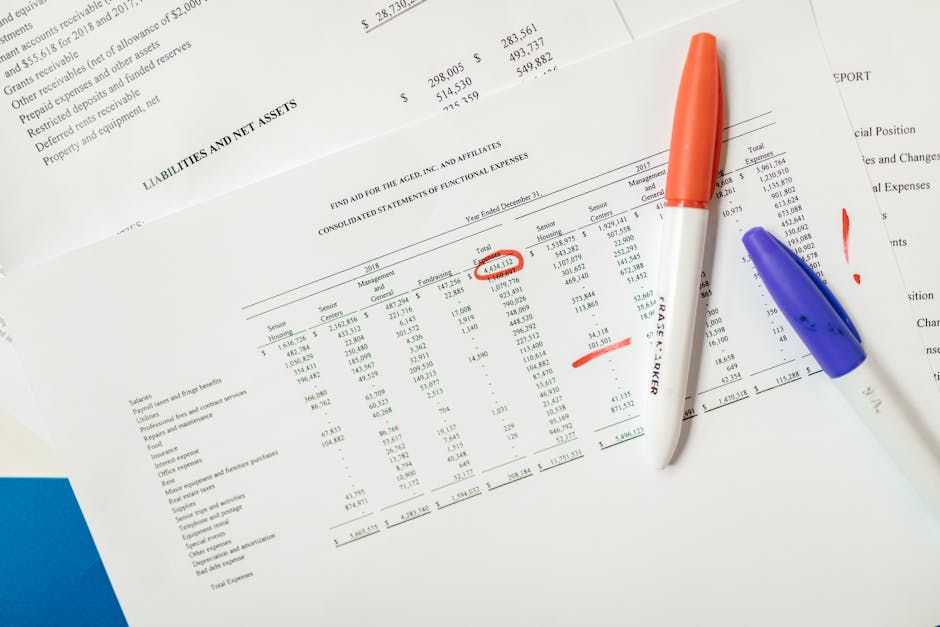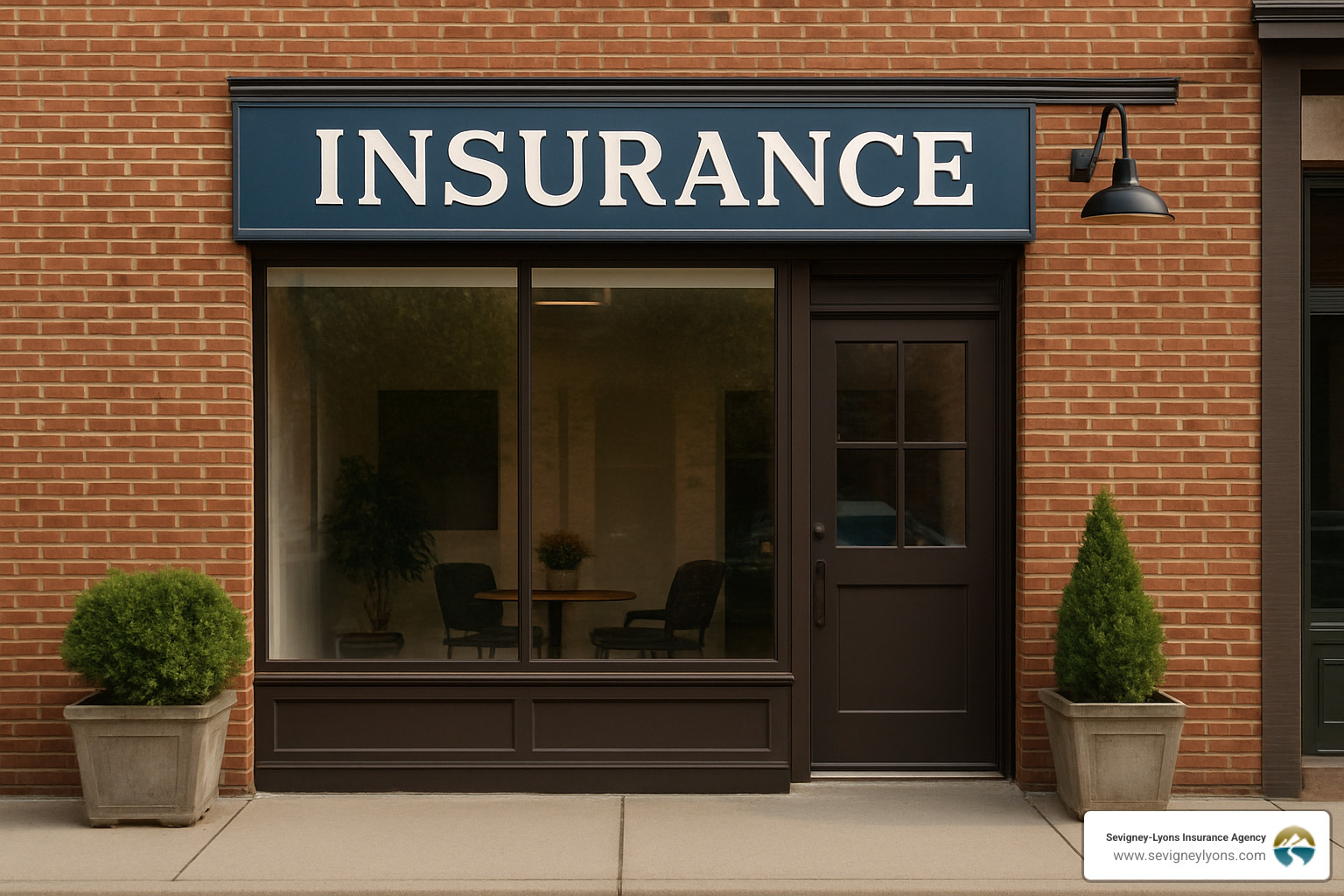Blog Content
Understanding Professional Liability: Essential Protection for Maine Professionals
What is professional liability is a crucial question for any Maine professional. It refers to the legal responsibility you have when your advice or services cause financial harm to a client, even without physical injury or property damage.
Key aspects of professional liability:
- Legal obligation to meet professional standards of care
- Financial responsibility for errors, omissions, or negligent acts
- Protection through insurance against costly lawsuits and defense costs
- Coverage for claims-made during the policy period
- Essential for service-based businesses in Maine
Whether you're a consultant in Wells, an accountant in Kennebunk, or an engineer in Biddeford, understanding professional liability is critical to protecting your business.
The stakes are real. A single mistake, like a missed deadline or incorrect advice, can trigger a lawsuit costing hundreds of thousands in legal fees and damages. Even defending against frivolous claims can drain your resources and damage your reputation.
Professional liability insurance, also known as Errors & Omissions (E&O) coverage, provides a financial shield. It covers legal defense costs, settlements, and judgments when clients claim your professional services caused them financial loss.

What is Professional Liability Insurance and What Does It Cover?
What is professional liability insurance? It's a financial safety net for when clients claim your professional services caused them to lose money. Unlike general liability insurance that covers physical harm and property damage, this policy steps in when your expertise or advice is the center of a lawsuit.
Depending on your field, you may hear it called malpractice insurance (common for medical professionals) or Errors & Omissions (E&O) insurance. The purpose is the same: protecting your Maine business from the high costs of defending against claims and paying settlements or judgments.
Even the most careful professionals can make mistakes or be blamed for issues that weren't their fault. Defending your business in court is expensive, and legal bills can pile up quickly. Professional liability insurance covers these legal defense costs, along with any settlements or judgments that result from a claim.
This coverage is for liability from errors in professional services that cause economic losses. It protects your financial stability and the reputation you've worked to build.
Defining What is Professional Liability
Every professional has a professional duty to their clients, meaning you must meet a reasonable standard of care. When you open a practice in Wells or Kennebunk, you promise to perform your work competently.
Professional liability arises when a client alleges you failed in this duty through a mistake or omission. If these alleged mistakes lead to client damages (financial loss), a claim can be filed. It doesn't matter if you actually did anything wrong; if a client thinks you did and sues, you'll face legal costs. Your contractual obligations also play a role. If a client claims you didn't deliver on a contract and they suffered financially, professional liability insurance provides protection for your Maine business.
Covered Claims: Real-World Scenarios
Professional liability insurance covers a wide range of claims arising from your services. We've seen many of these scenarios affect our clients over the years.

- Negligence: This is the most common claim. For example, a financial consultant in Biddeford gives advice that leads to client losses, or an engineer's calculation error causes costly construction delays.
- Misrepresentation: A real estate agent fails to disclose a property issue, or a marketing consultant overstates a campaign's expected results, leading to a lawsuit.
- Inaccurate advice: An accountant gives incorrect tax guidance that results in penalties for a client, or a business consultant's strategy fails to deliver.
- Missed deadlines: A software developer in Ogunquit fails to deliver a critical component on time, causing their client to miss a product launch and incur financial losses.
- Breach of contract: A client feels you didn't deliver what was promised in the scope of work and seeks compensation.
- Copyright infringement: An ad agency accidentally uses copyrighted material, leading to legal action and claims from their client for reputational damage.
Common Policy Exclusions
It's important to know what professional liability insurance doesn't cover to avoid dangerous gaps in your protection. These are some common exclusions:
- Bodily injury and property damage: These are covered by general liability insurance, not professional liability.
- Criminal acts and fraudulent acts: Insurance is designed for honest mistakes and oversights, not intentional wrongdoing.
- Employment disputes: Wrongful termination or discrimination claims require a separate policy, such as Employment Practices Liability Insurance.
- Cyber liability: Data breaches or theft of client data typically require a separate cyber insurance policy.
We work with over 20 top carriers to build comprehensive protection. For more details on creating complete coverage for your Maine business, see our Business Insurance Coverage in Maine page.
Key Policy Features: Understanding the Fine Print
Understanding the key features of your professional liability policy is essential for protecting your Maine business. We've helped countless professionals from Ogunquit to Wells steer these details, and the fine print matters.
Most professional liability policies are "claims-made," which differs from other insurance and affects when coverage applies. Concepts like shrinking limits and defense costs can also significantly impact your coverage when you need it most. Not understanding how your policy works is like having a fire extinguisher but not knowing how to use it.
Claims-Made vs. Occurrence Policies
The timing of when your policy covers a claim depends on whether it's a claims-made or occurrence policy.
Claims-made policies, the industry standard for professional liability, cover claims that are both made against you and reported to the insurer during your active policy period. The work could have been done years earlier (after your retroactive date). For example, if a claim is filed after your policy expires for work done while it was active, you may not be covered. This makes continuous coverage critical.
Occurrence policies are rare for professional liability. They cover incidents that happened during the policy period, regardless of when the claim is filed. They are generally not available for professional services because errors can lead to claims years after the work was completed.
Almost all professional liability policies in Maine are claims-made, so understanding them is crucial.
The Importance of a Retroactive Date
Your retroactive date is a critical policy detail. It sets the earliest date from which your professional services are covered. Any claims from work done before this date typically won't be covered.
For instance, if an architect in Kennebunk starts a new policy on March 1, 2024, with a retroactive date of March 1, 2022, a claim filed in 2024 for a design error from 2021 would not be covered. This is especially important when switching insurers or if you've had coverage gaps, as a new insurer might not match your previous retroactive date.
Prior acts coverage is what protects you for work done before your current policy started but after your retroactive date.
Tail Coverage (Extended Reporting Period)
When you retire from your Biddeford consulting business, sell your practice, or cancel your policy, clients can still file claims for your past work. Tail coverage, also called an Extended Reporting Period, solves this problem.
It provides an extended window to report claims that arise from services you provided while your policy was active. Without it, you could be personally liable for lawsuits related to past work. You should consider tail coverage if you're retiring, selling your business, or switching to a new insurer that won't cover your prior acts.
Tail coverage costs typically run 2-3 times your expiring annual premium. While not cheap, it provides essential peace of mind for many Maine professionals, protecting your retirement savings from a future lawsuit. It's best to plan for this expense in advance.
Who Needs This Coverage in Maine?
If you provide advice, expertise, or specialized services to clients in Maine, you likely need professional liability insurance. The definition of "professional" has expanded far beyond traditional licensed roles.
Whether you run a consulting firm in Wells, an accounting practice in Kennebunk, or a marketing agency in Biddeford, your expertise puts you at risk. If a client could suffer financial loss from a mistake in your service, you need this coverage. This includes management consultants, IT professionals, architects, engineers, and financial advisors.
Unexpected claims can affect any professional, from a photographer in Ogunquit who loses files to an environmental consultant whose analysis is questioned. Even notaries can face claims for documentation errors. The common thread is that their knowledge and skills are central to their service. Professional liability insurance provides the protection they need to defend themselves.

What is Professional Liability vs. General Liability?
Understanding the difference between professional and general liability is crucial. Simply put: professional liability protects your expertise, while general liability protects your physical business operations.
Professional liability insurance covers financial harm to a client from your professional services, like an architect's design error that requires costly corrections.
General liability insurance covers physical risks, such as a client slipping in your office or an employee damaging a client's property.
Many businesses need both. For example, if a client visits your Kennebunk office and trips, it's a general liability claim. If the advice you give in that meeting leads to a failed business venture, it's a professional liability claim.
Professional LiabilityGeneral LiabilityCovers financial losses from professional errorsCovers bodily injury and property damageProtects against negligence in servicesProtects against accidents on your premisesEssential for advice-based businessesEssential for all businessesClaims can surface years laterClaims typically arise immediately
These two policies complement each other. For more on this foundational coverage, see our guide on Learn about General Liability Insurance in Maine.
Is Coverage Required for My Profession?
Whether this insurance is legally required in Maine depends on your profession. However, practical realities often make it essential regardless of mandates.
State regulations require certain licensed professionals, like lawyers and some medical practitioners, to carry coverage. Professional associations also often require it for membership.
Most practically, client contracts are increasingly demanding proof of insurance. We've seen businesses in Wells and Ogunquit lose contracts because they couldn't provide a certificate of insurance. Having coverage also provides a competitive advantage, signaling professionalism and risk management.
Most importantly, protecting your assets in Maine is the top priority. A single claim can result in legal fees that could wipe out your savings. The peace of mind from knowing you're protected is invaluable.
The Financials: Cost and Limiting Your Risk
The cost of professional liability insurance is often more affordable than business owners expect, and far less than the cost of a lawsuit. Defending a claim can easily cost $50,000 to $100,000, even if you did nothing wrong.
For most Maine businesses, annual premiums range from $600 to $1,200, with a median cost of about $735 per year (around $60 per month). This is a small price for protection against potentially devastating financial losses. For more detailed cost insights, refer to our article on Details on Maine Business Liability Insurance Cost.
How Much Does Professional Liability Insurance Cost?
The cost of your policy depends on your business's unique risk profile. When we work with clients from Wells to Biddeford, we examine these variables to find the right balance of protection and affordability.
- Your industry and profession: This is the biggest factor. A structural engineer faces different risks and higher potential claim values than a freelance graphic designer.
- Your business size and revenue: A solo consultant in Kennebunk will pay less than a firm with ten employees. More revenue often means larger projects and larger potential claims.
- Your claims history: A clean record keeps premiums down, while past claims can increase costs.
- Coverage limits and deductibles: Most businesses choose limits between $1 million and $2 million. Higher limits cost more but offer greater protection. A higher deductible can lower your premium but increases your out-of-pocket cost if a claim occurs.

An IT consultant might see premiums from $600 to $2,000, depending on their services. The best way to know your cost is to get a personalized quote for your Ogunquit business, allowing us to compare options from our network of carriers.
How to Limit Your Professional Liability Exposure
Smart business practices reduce your liability risk and can help lower insurance premiums. These strategies work with your coverage to create comprehensive protection.
- Strong contracts: Use clear, detailed agreements to define project scope, timelines, and responsibilities to prevent misunderstandings.
- Clear communication: Keep clients informed, manage their expectations, and address concerns immediately to prevent problems from escalating.
- Thorough documentation: Save emails, meeting notes, and client approvals. Detailed records can help resolve disputes quickly by proving what actually happened.
- Quality control procedures: Implement peer reviews or checklists to catch errors before they affect clients.
- Ongoing training: Keep your team's skills sharp and up-to-date with industry standards to prevent errors.
Combining these risk management strategies with professional liability insurance creates powerful protection for your Maine business.
Frequently Asked Questions about Professional Liability
Here are answers to the most common questions we hear from Maine business owners in Wells, Biddeford, and Kennebunk about this essential coverage.
What's the main difference between professional liability and general liability insurance?
This is the most frequent question we get. The core difference is the type of risk covered: professional liability covers financial losses a client suffers due to your professional mistakes, while general liability covers physical injuries and property damage.
For example, bad investment advice from a financial advisor in Ogunquit causing client losses is a professional liability claim. If that same client slips and falls in your office, it's a general liability claim. Professional liability protects your expertise, while general liability protects against everyday business accidents. Most Maine businesses need both.
Is professional liability insurance required by law in Maine?
It's not universally mandated by Maine law, but certain professions like law and some medical professionals are required to have it for licensing.
Even when not legally required, it's practically essential. Increasingly, clients in Maine require proof of insurance before signing a contract. We've seen businesses in Wells and Biddeford lose out on work because they couldn't provide a certificate of insurance. Beyond client demands or legal mandates, what is professional liability insurance other than peace of mind that a single mistake won't destroy your business?
What happens if I switch insurance providers?
This is a critical technical point for claims-made policies. Switching providers requires careful management of your retroactive date to avoid a dangerous gap in protection.
Because most professional liability policies are "claims-made," they only cover claims reported during the active policy period. If a claim is filed after you switch carriers for past work, coverage depends on how you managed the transition. You have two main options:
- Purchase "tail coverage" from your old insurer to extend the reporting period for claims.
- Ensure your new policy includes "prior acts" coverage that honors your original retroactive date.
We work closely with our clients during these transitions to coordinate between carriers and ensure there are no gaps in coverage. Saving a few dollars on premiums isn't worth finding you're uninsured for past work.
Conclusion
Understanding what is professional liability insurance is all about shows why it's a cornerstone of smart business planning. It's a financial lifeline when clients claim your professional services caused them harm.
You've spent years building your expertise, whether you're an architect in Wells, a consultant in Kennebunk, or an IT professional in Biddeford. Professional liability insurance protects that hard work from being wiped out by a single lawsuit.
The key takeaways we've covered:
- Claims-made policies require continuous coverage and attention to your retroactive date.
- Tail coverage is essential when retiring, selling your business, or switching carriers.
- Risk management practices like strong contracts work hand-in-hand with insurance.
- Both professional and general liability are needed for complete protection.
The peace of mind from proper coverage is invaluable, allowing you to focus on serving clients and growing your business, knowing your reputation is protected.
At Sevigney-Lyons Insurance Agency, we've helped Maine professionals steer these issues for decades. Our deep roots in communities like Ogunquit, York and Wells give us unique insight into local business challenges. We work with over 20 top carriers to find the right policy for your specific needs.
Don't leave your professional future to chance. The cost of coverage is minimal compared to the impact of an uninsured claim. For a complete review of your needs, explore our Business Insurance Coverage in Maine.
We're here to help protect what matters most – your business, your assets, and your peace of mind.







